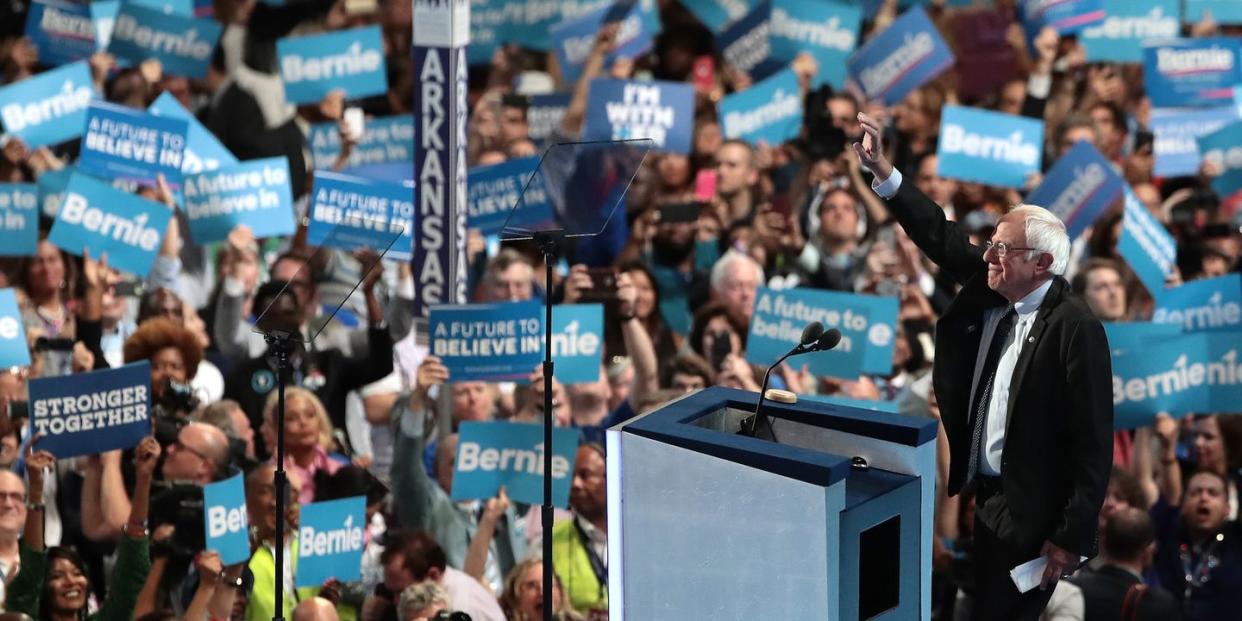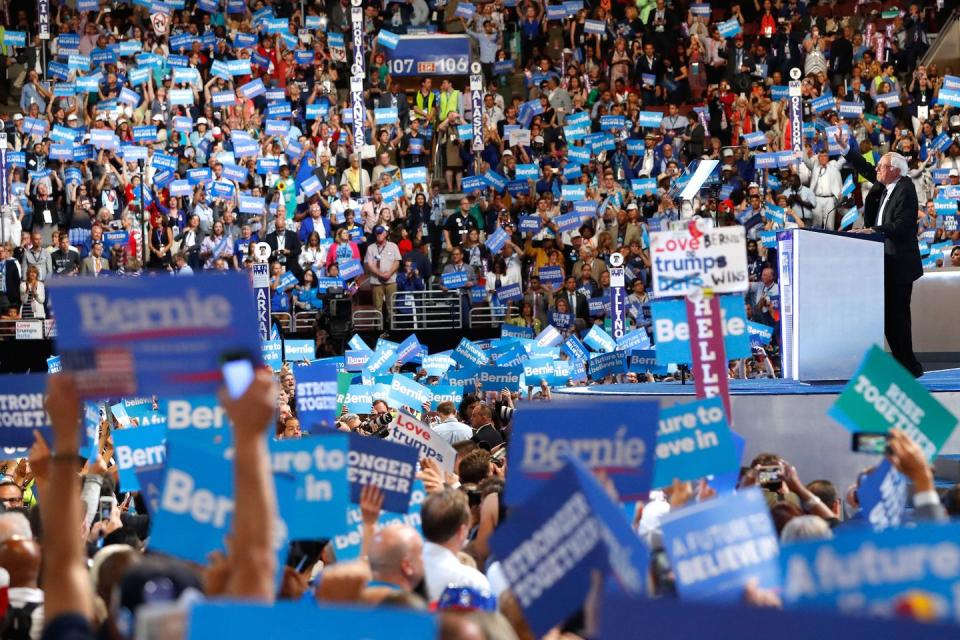These Democratic Convention Delegates Are Talking Crazy About Replacing Bernie Sanders

One request we might make of various Politics Experts this election cycle is simple: if you got it wrong in 2016—if you were convinced Hillary Clinton was the Electable candidate in that Democratic primary, if you said Donald Trump's rise to the Republican nomination was good because he'd be easy to beat, if you predicted Clinton would win handily—maybe don't make 100-percent-confident declarations about what will happen this time. Maybe demonstrate a bit of humility and just observe what's happening! Maybe accept that you may not exactly have a finger on the pulse of what's motivating voters and what it will take to win.
It looks like we'll have to roll out a corollary to this, tailor-made for the kind of Democratic leaders who pine for the days of smoke-filled rooms where they would choose the nominee among themselves without any interference from actual voters. Or at least, who would prefer that scenario to nominating Bernie Sanders. The New York Times had a chat with a bunch of Democratic superdelegates and other so-called Establishment Leaders and had quite a takeaway.
Dozens of interviews with Democratic establishment leaders this week show that they are not just worried about Mr. Sanders’s candidacy, but are also willing to risk intraparty damage to stop his nomination at the national convention in July if they get the chance. Since Mr. Sanders’s victory in Nevada’s caucuses on Saturday, The Times has interviewed 93 party officials — all of them superdelegates, who could have a say on the nominee at the convention — and found overwhelming opposition to handing the Vermont senator the nomination if he arrived with the most delegates but fell short of a majority.
Here we wade into a familiar argument: you need 1,991 delegates to win the nomination outright, and if no one gets that, there could be a brokered convention where the person who got the most votes—but not an outright majority—is not the nominee. At the Nevada debate last week, only Bernie Sanders said the candidate who gets a plurality of delegates should get the nomination, because that will likely be him. The other candidates refused to commit to that in order to leave the door open to their own brokered victories. When challenged on that position at a town hall in South Carolina last night, Elizabeth Warren had a pretty good response:
Elizabeth Warren is right. pic.twitter.com/EegW7Dz77V
— Sawyer Hackett (@SawyerHackett) February 27, 2020
Those are indeed the rules, Sanders did indeed help craft them, and Sanders did indeed take the opposite position in 2016 when that was to his advantage. (Hillary Clinton was set to have a plurality, but not a majority, of delegates going into the convention.) But you'll notice Sanders did not ultimately pursue that route in 2016, though he held out a while—and some would say too long—before he endorsed Clinton and held a bunch of rallies on her behalf in the general election. (Some of his supporters did make a ruckus at the convention despite his declaring his support for Clinton.) Warren's position is coherent, but the practical implications are potentially disastrous. For all the worried talk of Sanders as another George McGovern, a chaotic convention where the delegate leader is jettisoned for someone chosen by The Folks Behind the Curtain could shake the public's faith in the Democratic ticket nearly as much as McGovern's display of catastrophic judgment in the Eagleton Affair.
More to the point, these Wise Men of the Democratic Party are not, at least as they appear in the Times, particularly wise. A number of them seem to think they can randomly choose a person who is not running to be the nominee.
“If you could get to a convention and pick Sherrod Brown, that would be wonderful, but that’s more like a novel,” Representative Steve Cohen of Tennessee said. “Donald Trump’s presidency is like a horror story, so if you can have a horror story you might as well have a novel.” ...
A number of superdelegates dream of a savior candidate who is not now in the race, perhaps Mr. Brown, or maybe someone who already dropped out the race, like Senator Kamala Harris of California.
Representative Don Beyer of Virginia cast an even wider net, suggesting senators from Virginia and Delaware, along with Ms. Pelosi, as possible nominees.
“At some point you could imagine saying, ‘Let’s go get Mark Warner, Chris Coons, Nancy Pelosi,’” he said, while preparing to introduce the former Mayor Pete Buttigieg of South Bend., Ind., at a campaign event near his home on Sunday. “Somebody that could win and we could all get behind and celebrate.”
This is, to put it mildly, insane. These people are high on their own supply.
Justified or not, Nancy Pelosi's favorability with the public is 39 percent, 13 points underwater. Bernie Sanders's is 45, three points underwater but the best in the field of people actually running for the job. What is Chris Coons's name recognition with the public? What is the evidence he could run a national campaign that would galvanize the base and attract new voters to the party? And what argument is there for Kamala Harris, someone who dropped out of the 2020 race in 2019, other than we want her? What would be the purpose of Mark Warner's presidential campaign? Why do none of these people seem to believe that you have to run for something beyond Trump Is Bad? And how do these people expect to win when they alienate the party's left flank, its young voters, and increasingly, voters of color, all of whom currently trend towards Sanders? These folks will have plenty of reason to believe the Democratic Party does not represent them.

And then, of course, there's Walter Mondale, discussing whether delegates will make Sanders the nominee if he has more delegates than anyone else.
“I’ve had 60 years experience with Democratic delegates — I don’t think they will do anything like that,” said former Vice President Walter Mondale, who is a superdelegate. “They will each do what they want to do, and somehow they will work it out. God knows how.”
As for his own vote, Mr. Mondale, the 1984 Democratic presidential nominee, said, “I vote for the person I think should be president.”
As the 1984 Democratic nominee running against incumbent Ronald Reagan, Mondale won one state and 13 electoral votes. Reagan took 525 electoral votes and won the popular vote by 18.2 percent. But maybe Mondale knows who can win in 2020.
There seems to be an overwhelming sense among delegates to the Democratic National Convention that the election can only be won by sticking to the old ways, by returning to the Before Times. What no one seems willing to contemplate is that we are never going back. There is no normal to go back to. Just as NeverTrump Republicans have mostly convinced themselves he's an aberration within their party, it seems the Democratic Establishment has convinced itself he is not the symptom of any deeper, structural problems in how we run our shop. There was something so fundamentally broken in this country that we elected a racist game-show host over a former Secretary of State the last time, and now a man who calls himself a democratic socialist—whose actual policies are more New Deal Democrat—is winning the primary race. Maybe it's because he's promising to transform the way we do things in a country where the actual voting public doesn't seem to like how things are done.
You Might Also Like


